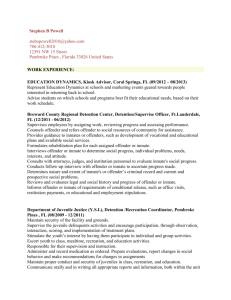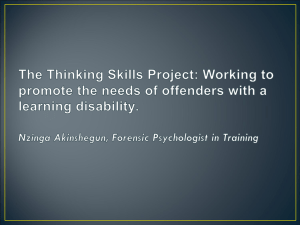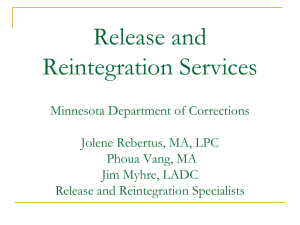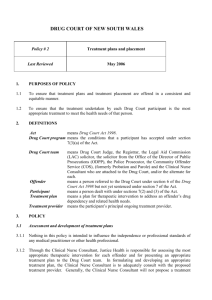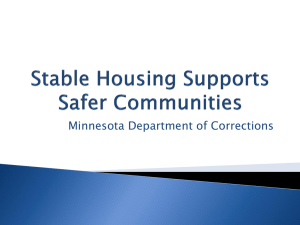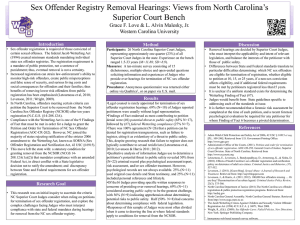Improving Health, Supporting Justice in the East of England (ppt
advertisement
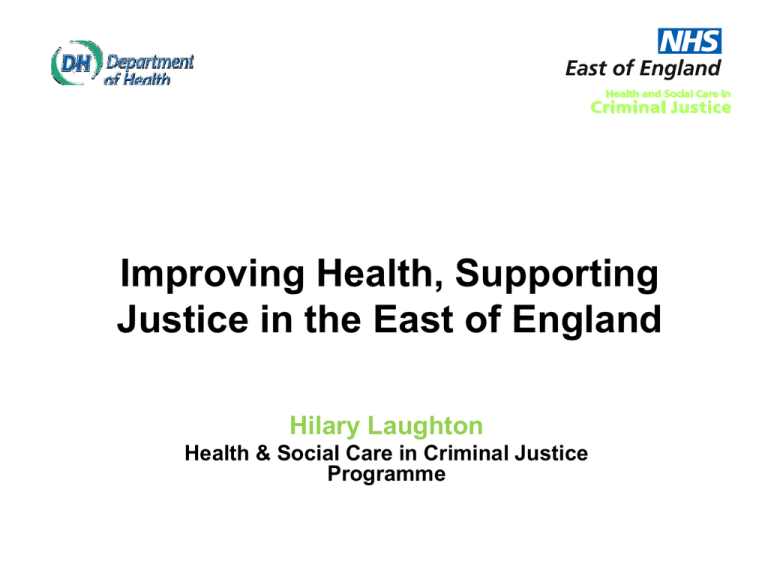
Improving Health, Supporting Justice in the East of England Hilary Laughton Health & Social Care in Criminal Justice Programme Improving Health, Supporting Justice in the East of England Function and purpose of regional HSCCJ Programme Regional Governance for Offender Health Lord Bradley’s Review National Offender Health Delivery Plans 2010/11 East of England PCT Commissioning Framework Alcohol and Offender Health Development of regional service standards and enablers for Offender Health Next Steps HSCCJ - What is it, and what does it do? Regional programme for Offender Health (DH) Building and developing partnerships across health and criminal justice which will: Deliver better health outcomes for offenders Support a reduction in offending Key drivers include Bradley Review and National Offender Health Delivery Plan Increasing multi-agency focus on offender health across whole criminal justice pathway Regional Governance HSCCJ Strategic Partnership Board Multi-agency board bringing together senior stakeholders from health and criminal justice at the regional level Responsible for setting strategic direction for the development and implementation of health and wellbeing services for people in contact with the CJS in the EoE Lord Bradley’s Review Commissioned by Justice Secretary Dec 07 Reported April 09 - 82 recommendations Strong partnerships between health and the CJS Effective, early intervention to screen, assess and make appropriate referral Need to build strong multi-Agency Offender Health services / teams to support effective early intervention across CJS pathway National Offender Health Delivery Plan Five cross-Government high-level Objectives: 1. 2. 3. 4. 5. Improving efficiency and effectiveness Working in partnership Improving capacity and capability Equity of access Improving pathways and continuity of care PCT Commissioning Framework For the first time, the 2010/11 EoE Commissioning Framework contains specific reference to PCT responsibilities for Offender Health These operational requirements mirror the priorities for Bradley and National Delivery Plan All PCT’s have developed operational plans detailing how the delivery of Offender Health priorities will be achieved Alcohol and Crime Children who have begun binge drinking by the age of 16 are 90% more likely to have criminal convictions by the age of 30 Alcohol and Crime cont… 44% of young adults (18-24) are binge drinkers 48% of violent crimes are committed under the influence of alcohol 63% of sentenced men and 39% of sentenced women admitted to hazardous drinking 49% of probation assessments identified alcohol as an influence on offending behaviour Development of regional Service Standards and Enablers for Offender Health Emphasis on mental health and learning disability (mirroring Bradley) Focus on Adults and key CJS intervention points – Police, Court, Probation Approved Premises Advised / informed by multi-agency practitioner groups from across the region A toolkit to support PCTs in delivering against the EoE priorities for offender health Cost benefit analysis and model The product System ‘enablers’ across all intervention points in relation to: Organisational arrangements Quality of services Data collection/performance management Training Service user engagement The product Framework setting out specific standards for each intervention point: Screening Assessment Access to services Liaison and information sharing Through care A description of what “good” looks like for health service interventions across the CJS Key themes County-wide governance is crucial Multi-agency responsibility for this agenda Timely/consistent screening and assessment Information sharing is vital Multi-agency offender health services Better access to existing services Training Health must lead but cannot do it alone! Next Steps Validate the PCT Action Plans for Offender Health Test, validate & review the standards & enablers framework with local systems / partners Support development of local multi-agency governance arrangements Begin process of benchmarking current services against indicative standards for Offender Health Gap analysis and planning for service commissioning /re-configuration Key messages Strong partnerships to deliver more effective health, MH and LD interventions Offender health is a key component of Integrated Offender Management (IOM) Steered regionally by the HSCCJ Partnership Board, but local ownership and governance of delivery is critical Health must lead development and commissioning of health services, but cannot do this without strong CJS engagement Health and Social Care in Criminal Justice East of England Region Contacts Hilary Laughton Susan Grey Neil McIntosh Rob Jayne

